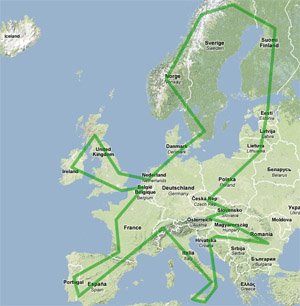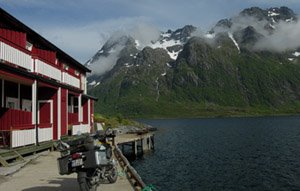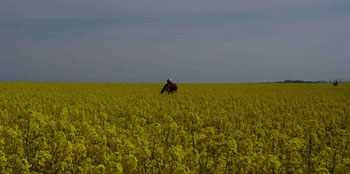Yesterday have been 3 weeks since I left Bucharest and I’m on my last day (out of 3) in Warsaw heading tomorrow for Gdansk and the polish lakes district on my way to Vilnius. I wish I would have written more, made more pictures but the time seems so very short and the things to do, see, feel, think about, almost infinite. There are places where I would have just sat and contemplated the view for days and people I’ve met I would have spent so much more time with, but I’m on a journey and leaving a place for another is how it’s done, and I still haven’t acquired the art of ancient oriental masters who had space and time in their grasp and could be in more places at the same time...
Is there yet a first important idea, lesson or conclusion that these first 3 weeks offered me? Yes, I have learned that nature in itself is beautiful and impressive absolutely everywhere, majestic mountains, rolling hills or ever-stretching plains. Beside this, what people inhabiting it have been and continue doing in and with it carries exceptional influence on how one relates to and remembers a place or another. In other words the nature of this world is wonderful but it is in conjunction with the particular cultures of every region that it gives us the entire magnificent gift of living in it and having the unique chance to discover it.
The Hungarian, Czech or Polish flatlands that I have crossed might not be as impressive as the breathtaking Alps but their rich and almost endless green, undulating hills and sense of tranquility stir no less a lasting emotion in the traveler. The major differences in perceiving and relating to a place are determined by the contacts with it’s inhabitants and the way they exist in their own environment. The aspect of villages, the cultural heritage of the cities (large or small), the attitude and expression on people’s faces make the difference in the way we ultimately perceive places. Here we can also discern a very fine balanced mix between the cultural heritage of a place, usually to be discovered in stone and metal, i.e. in it’s monuments and buildings, and it’s living spirit that comes out by the more or less silent concert of it’s people. The way they dress, walk, look around and at others around them, greet strangers or their neighbors, deal with side effects of every community (poverty, trash, the public/private space dialog), what they dress, eat and what (and how much) they drink, are just some things building up to one’s personal experience of a place.
Is there yet a first important idea, lesson or conclusion that these first 3 weeks offered me? Yes, I have learned that nature in itself is beautiful and impressive absolutely everywhere, majestic mountains, rolling hills or ever-stretching plains. Beside this, what people inhabiting it have been and continue doing in and with it carries exceptional influence on how one relates to and remembers a place or another. In other words the nature of this world is wonderful but it is in conjunction with the particular cultures of every region that it gives us the entire magnificent gift of living in it and having the unique chance to discover it.
The Hungarian, Czech or Polish flatlands that I have crossed might not be as impressive as the breathtaking Alps but their rich and almost endless green, undulating hills and sense of tranquility stir no less a lasting emotion in the traveler. The major differences in perceiving and relating to a place are determined by the contacts with it’s inhabitants and the way they exist in their own environment. The aspect of villages, the cultural heritage of the cities (large or small), the attitude and expression on people’s faces make the difference in the way we ultimately perceive places. Here we can also discern a very fine balanced mix between the cultural heritage of a place, usually to be discovered in stone and metal, i.e. in it’s monuments and buildings, and it’s living spirit that comes out by the more or less silent concert of it’s people. The way they dress, walk, look around and at others around them, greet strangers or their neighbors, deal with side effects of every community (poverty, trash, the public/private space dialog), what they dress, eat and what (and how much) they drink, are just some things building up to one’s personal experience of a place.
On these grounds and despite the mythology about people of the two countries not being to friendly to each other (well, at least in Romania it is believed that Hungarians are not friendly to us...) I was most impressed in such a good way by Hungary among the former East European countries I have been through by now (Czech Rep. and Poland). The Czechs might be more “joyful” and the Poles more ... well, I don’t precisely know how they are yet as I have some conflicting impressions, but the Hungarians are the more “stylish”, more elitist and somehow more fancy of them. I also don’t by what determination, collective effort or general behavior they manage too keep a country more clean than you might ever expect in Eastern Europe. I haven’t seen for tens if not hundreds of miles a plastic bottle or any other kind of trash on the side of a city or country road. It really doesn’t feel like the East as in Czechia or Poland, where although both very nice and burdened with history, the “clean” aspect does not seem to be of prime importance or of much interest to their people. Not that they are filthy in any way, but the places just don’t have the "shine" they have in Hungary. What to mention about my home country in this respect? Any comparison with any of them would put us to very much shame...
But after the rather long time since I last posted and the countries I have been through already I am tempted to write too much so I’ll stop here, as abrupt as it is, and come back later with more crystallized thoughts and impressions, but not before making a short note of praise to my beemer: Almost 9.000km on the clock and not even a single glitch! I love this bike.





No comments:
Post a Comment